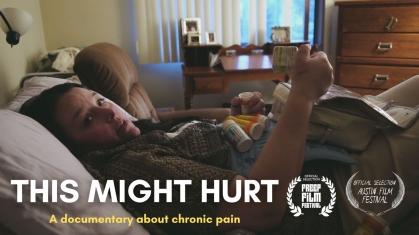New Approaches to Treating Chronic Pain
Includes free screening of the documentary film “This Might Hurt"

View trailer HERE
Course Description
Chronic pain is one of the major health problems today. Over 100 million people are affected by chronic pain, more than the number dealing with cancer, heart disease, and diabetes combined. And yet, medical treatments - dominated by medications, injections, and surgery - by and large do not work.
Psychological approaches to chronic pain have traditionally focused on “managing” the pain and its impact. However, starting in 1973, John Sarno, MD developed a new way to think about chronic pain that led to psychological treatments that actually eliminate the pain, truly curing people of pain they may have endured for years or decades. Disorders such as those labeled as degenerative disk disease, carpel tunnel, sciatica, TMJ, whiplash, have been successfully treated in this way. The approach has also been successfully applied to medically unexplained conditions, and other mind-body disorders such as fibromyalgia and chronic fatigue. Dr. Axelbank will present Dr. Sarno’s work, and more recent variants, an interesting hybrid of psychoanalytic theory and a treatment that combines psychodynamic therapy with some cognitive elements. We will use some excerpts from a documentary movie on Dr. Sarno’s work, "All The Rage," as well as personal examples and cases Dr. Axelbank has treated in his psychotherapy practice, and supporting research will be summarized. This presentation includes screening the movie “This Might Hurt,” which follows a cohort of patients through Dr. Howard Schubiner’s group-based treatment program, a variation on Dr. Sarno’s approach.
Learning Objectives
- Participants will be able to identify the three pillars of John Sarno’s approach to chronic pain.
- Participants will be able to recognize and critique the evidence for mind-body disorders that are often labeled as medical or physical disorders
- Participants will be able to apply techniques to help their patients recognize the ways that their pain distracts them from unpleasant emotions
- Participants will be able to recognize the connections between adverse childhood events and trauma, and chronic pain
*Please note that the instructional portion with Dr. Axelbank will be awarded as 1.5 live credits, and the film viewing will be awarded as 1.5 Homestudy credits (with a post-test)*
Instructor Bio
Jeffrey Axelbank, Psy.D. is a psychologist in private practice in Highland Park, NJ. He provides individual and group therapy, specializing in complex trauma and chronic pain. He also consults to organizations and community groups using a whole-system approach to problems such as conflict resolution, strategic planning, burnout and morale, organizational culture, and change management. He also focuses on developing high-performing teams.
Dr. Axebank does not have any commercial support and/or conflict of interest for this program.
Contact Us
For questions, please email ce@gsapp.rutgers.edu
Continuing Education Information
Rutgers Graduate School of Applied and Professional Psychology (GSAPP) is recognized by the New York State Education Department's State Board for Psychology as an approved provider of continuing education for licensed psychologists #PSY-0123.
LMFT/MFT and LPC/LAC Licensed in New Jersey: Programs approved by the American Psychological Association are acceptable sources of continuing education credits. Please see https://www.njconsumeraffairs.gov/regulations/Chapter-34-Subchapters-10-31-Professional-Counselors.pdf, Section: 13:34-15.4 APPROVAL OF COURSES OR PROGRAMS on page 27. For all other professional licenses and certifications, please reference your issuing state board regulations regarding reciprocity of continuing education credits.
This program is approved for social work continuing education hours by Rutgers University Behavioral Health Care in accordance with New Jersey administrative code 13:44G-6.4 and recognized by The New Jersey Board of Social Work Examiners (NJBSWE). This program is approved for 3 clinical social work continuing education hours. This is only for NJ social workers.

In support of improving patient care, this activity has been planned and implemented by Rutgers Biomedical and Health Sciences, Rutgers University Behavioral Health Care, and Rutgers Graduate School of Applied and Professional Psychology. Rutgers Biomedical and Health Sciences is jointly accredited by the Accreditation Council for Continuing Medical Education (ACCME), the Accreditation Council for Pharmacy Education (ACPE), and the American Nurses Credentialing Center (ANCC), to provide continuing education for the healthcare team.
Nurses: This activity is awarded 3 contact hours (60 min CH).
Physicians: Rutgers Biomedical and Health Sciences designates this live activity for a maximum of 3 AMA PRA Category 1 Credits™

Rutgers Graduate School of Applied & Professional Psychology is approved by the American Psychological Association to sponsor continuing education for psychologists. Rutgers Graduate School of Applied & Professional Psychology maintains responsibility for this program and its content.